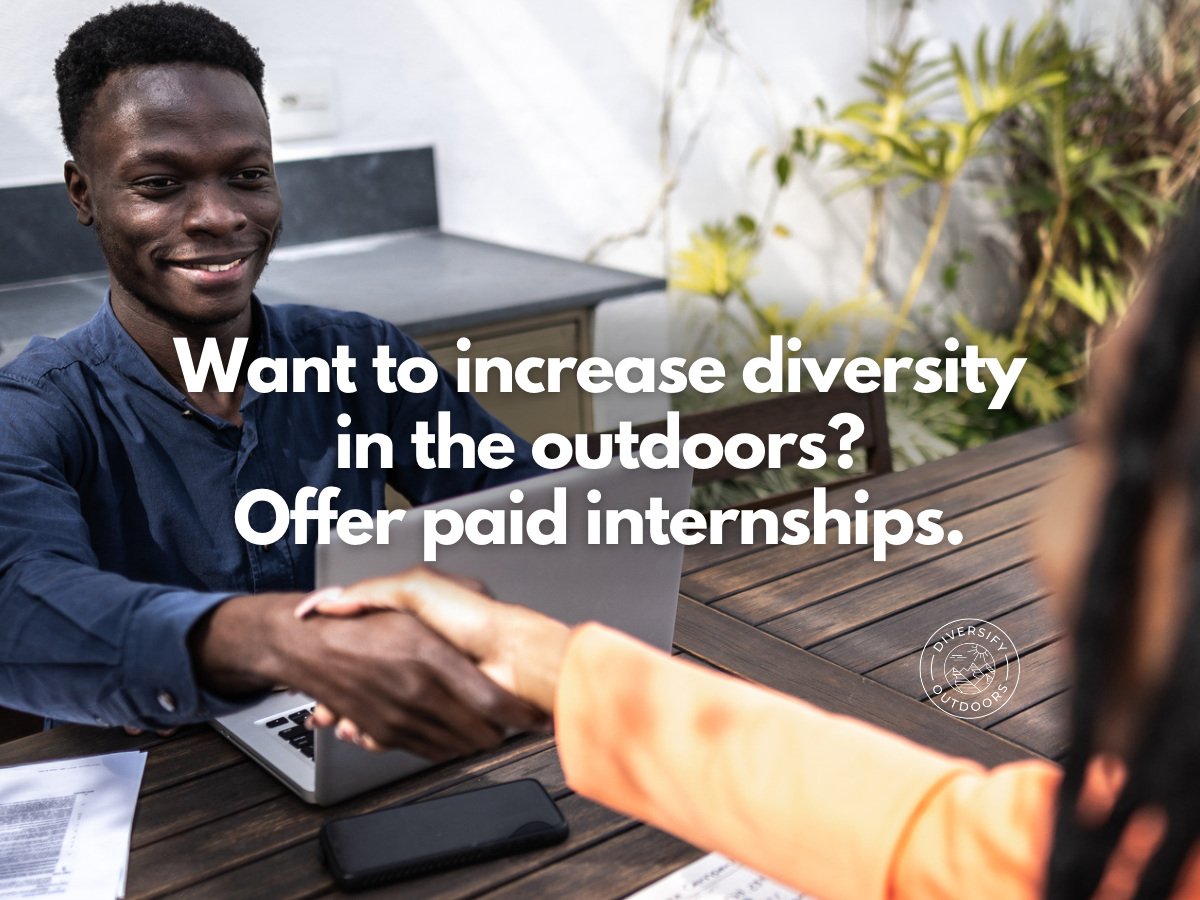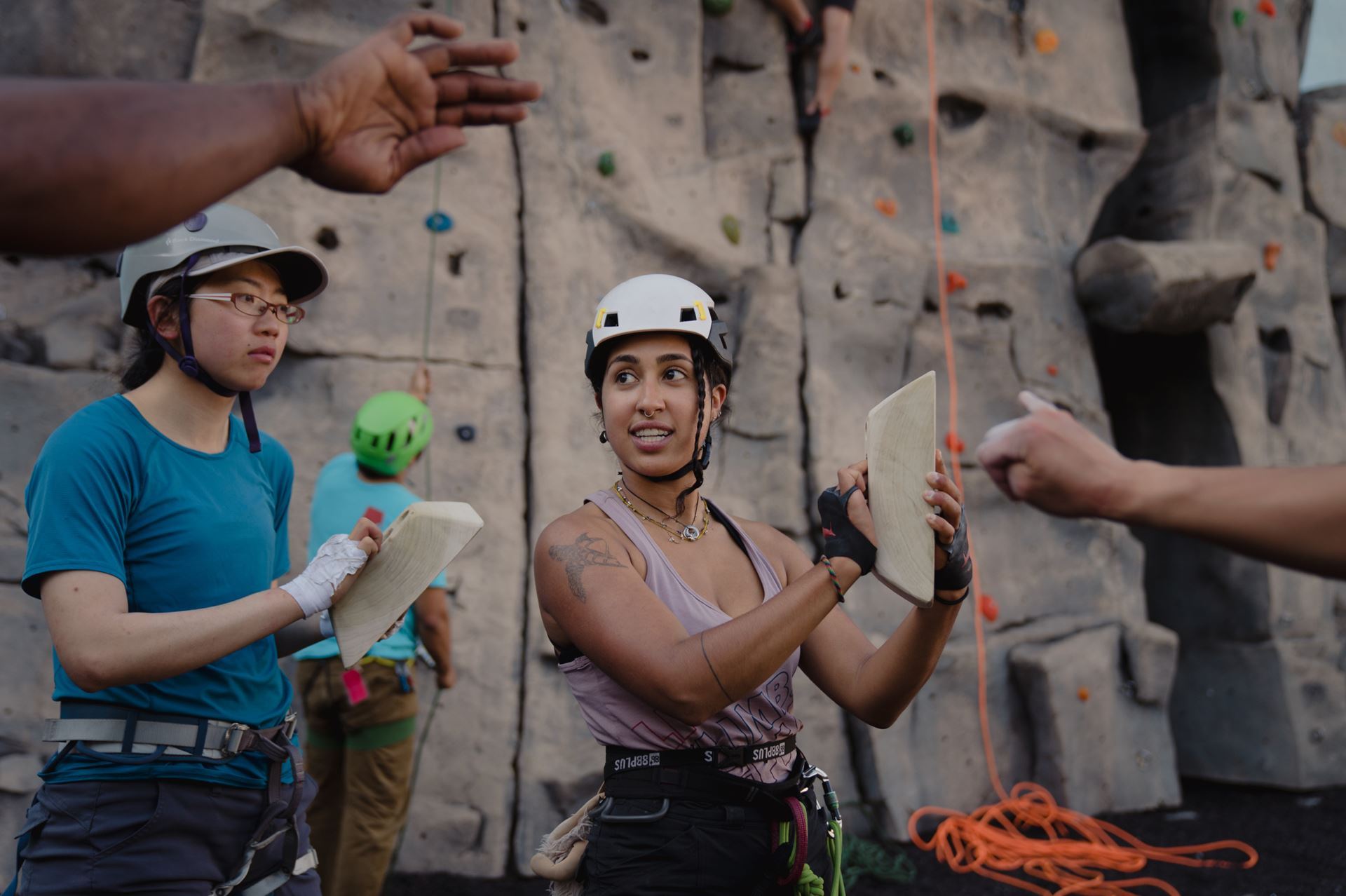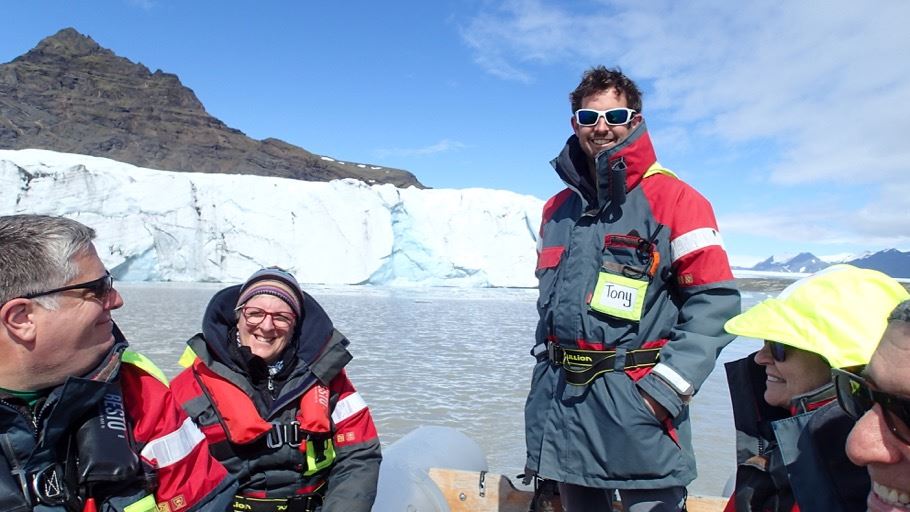

Photo credit: image source Unknown. Graphic Artist Unknown
By Katie Griffith
In recent years, many organizations in the environmental education and outdoor recreation fields have recognized the value of a diverse workforce. Some have signed onto initiatives like the Outdoor CEO Diversity Pledge, which is a commitment to hiring diverse staff and increasing representation. There are countless training courses in Diversity, Equity, and Inclusion that are designed for the outdoor industry, including those offered by Parker Bushman through Ecoinclusive. Building a diverse workforce can’t end with hiring; paying livable wages and offering paid internships is key to attracting and retaining staff from a variety of backgrounds. Keep reading for perspective from three different industry leaders.
As a young person growing up in the Bronx, Parker McMullen Bushman aka KWEEN WERK (she/they) developed an early connection to the outdoors through visiting local parks with her family, though they didn’t always consider themselves to be “outdoorsy.” After decades of working in the environmental education field, they recognize the sense of place and connection to their local ecosystem that they were able to cultivate just blocks from their home in the middle of the city.
View this post on Instagram
While working as an environmental educator on the coast of Georgia, Bushman recalls a group of students visiting from a predominantly Black school in Atlanta. As the youths experienced the ocean for the first time, Bushman felt she was able to connect with them in a real, authentic way. She could understand their concerns, because her own family members shared similar backgrounds.
“Identity isn’t everything,” she says, “but it’s special for those kids to be able to see someone that looks like them and have an understanding that this is something that is possible for them too.” By sharing elements of her identity with their students, Bushman opened up the outdoors to them.
Coming from a low-income family, Bushman faced barriers that her coworkers didn’t always share. While still in college, she was able to buy a car by working long hours at Subway. But when she returned to her job at a summer camp, they were unable to keep up with car payments, and her car was repossessed. Many of her coworkers had family helping them pay for vehicles or pay back college loans.
.jpg) Photo of Parker Bushman on a hike by Parker Bushman
Photo of Parker Bushman on a hike by Parker Bushman
“I loved the job!” Parker says, “I loved being in the outdoors and teaching about nature.” But it was often hard for her to justify the low wages to her friends and family, especially when residential education jobs took her away from her community.
Later in their career, when they were in a position to hire staff for environmental education roles, Bushman recognized the inequity created by unpaid internships. Hiring committees they worked with tended to value the experiences that candidates were able to gain through unpaid opportunities, like volunteering with conservation organizations or doing unpaid research. “They had these amazing experiences, and they were great educators,” says Bushman, “but we always got the same type of educator until we really started to examine that.”
Sof Petros (she/her) got her start in outdoor education while in college, leading first-year orientation trips during summer break and teaching skills at a local climbing gym. Now that she’s graduated, she’s unsure whether she can stay in the industry. “That structure went away, and it’s hard to feel like I can afford to take a seasonal job and the uncertainty that comes with it,” she says.
View this post on Instagram
Beyond low wages and the seasonal nature of jobs, Petros has faced other costs that present a barrier to entry in the guiding industry. Climbers, skiers, and other outdoor recreationalists are often required to complete technical certifications and wilderness medicine courses in order to work as guides or instructors. Certification courses and exams have mandatory prerequisites for candidates to complete, so aspiring guides often need to do a lot of unpaid work in addition to paying for certifications.
Petros completed her first level Single Pitch Instructor (SPI) course through the American Mountain Guides Association last year after receiving a scholarship. The next step toward certification is a two day exam, but she has been struggling to find the time to schedule it. After being laid off from her full-time job at an environmental nonprofit in June of 2022, Petros has picked up weekend shifts at a bar. Since most of the SPI exams happen on Saturdays and Sundays, Petros would also lose income by taking off work those days in addition to paying a few hundred dollars for an exam.
Petros is passionate about using climbing to build community, and she facilitates clinics for affinity groups through Climbers of Color and Out in the Wild. She is also participating in the guide mentorship program through She Moves Mountains. When she had a reliable salary and could work remotely, she had more flexibility to show up for events and seek out unpaid mentorship opportunities. Now the cost of gas to travel to climbing areas and lost wages present bigger barriers for her to make it to weekend events.

Petros recognizes that small organizations may not always be able to offer paid mentorship opportunities to help aspiring guides work toward certifications, but she thinks need-based stipends to attend would make a difference. Larger organizations can do more; the National Outdoor Leadership School offers a paid fellowship program for Black, Indigenous, and People of Color that guarantees a certain income while participants gain wilderness and leadership skills. Programs like this can provide a more stable pathway into the industry for folks from marginalized communities.
Financial barriers to access to outdoor industry jobs are not unique to the United States. Tony Waters (he/him) is the Operations and Adventure Manager for a Lofoten-based company that offers kayaking, sailing, fishing, diving, and surfing trips in Northern Norway. In most European countries, every type of outdoor guide must complete technical certifications in their discipline, and these aren’t always recognized between countries.
View this post on Instagram
If guides come from other countries, they often have to travel all over Norway to complete a multi-step certification process. “It’s just become this expensive, hoop-jumping exercise in order to get your paperwork in order at the start of the season,” says Waters. Due to strong labor laws in Norway and other Northern European countries, Waters says wages are fairly high, but the certification process can present a big barrier to entry for those who don’t come from financial means.
To address this barrier, Waters has pushed his company to use the shoulder seasons to offer more education programs, so prospective employees can complete several certifications in one location. Next spring he hopes to offer Wilderness First Aid, kayak guide training, and a skipper academy for folks who need to complete their Norwegian boat licenses. By offering three certifications sequentially, participants won’t have to repeat fundamental skills, which is an issue that occurs when they have to travel to multiple locations to take courses.
 Photo of Tony Waters in Vatnajökull National Park, Iceland by Mike Mul
Photo of Tony Waters in Vatnajökull National Park, Iceland by Mike Mul
Streamlining certification processes to reduce costs is just one of many solutions needed to promote equity in the outdoor workforce. This won’t solve every problem; Waters says guides in Norway also lack access to affordable housing, due to the high number of vacation rentals in resort towns. Even with relatively high wages, it is incredibly difficult to afford a place to live. This problem persists in the United States as well, and housing issues are causing worker shortages in service industries all over the Western US.
Creative solutions are still needed to cultivate a diverse workforce in the outdoor industry. For companies that are committed to diversity, living wages and paid internships are just a few key pieces of the puzzle. Streamlined certification processes, affordable housing, and need-based stipends for mentorship opportunities would also make a difference for guides and educators in the outdoor industry. As Bushman described, a diverse workforce can more authentically connect with diverse students and clients, making the outdoors more accessible for all.